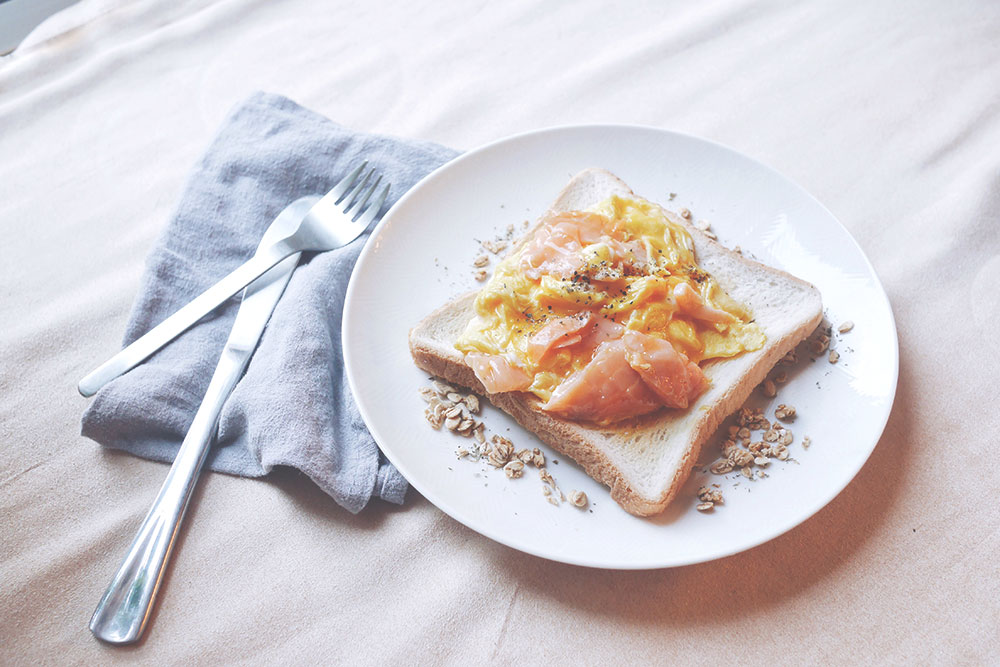When it comes to food, we’ve grown accustomed to the idea that obsessing over the details means we care more about our health. Learn how caring little less will help you establish a healthier relationship with yourself in the long run.
BY: EMILY FONNESBECK, RD, CD, CLT
Nutrition advice is often what we want to hear, and even feel you need. For those struggling with disordered eating, the lens in which it’s being filtered can be tremendously triggering, involving too much judgment, shame, and fear.
That’s OK though, you don’t need the nutrition advice to learn how to be a normal eater.
In fact, not having so much outside noise will enable you to connect to that innate part of you which knows how to eat. This may seem funny coming from a dietitian and trust me, I can understand that. When I received my degree and certification over 12 years ago, I truly thought I would help people by telling them what to eat. I soon realized that most people know what to eat.
In fact, the lack of information was not an issue and may actually be creating one.
Sure, nutrition is a science and that’s what drew me to the profession in the first place. I love the science of nutrition and because I understand it, I know you don’t have to overthink, overanalyze, or second guess it. What all those large-scale nutrition studies have told us over and over again is that healthy eating isn’t black-and-white. It has more to do with flexibility, variety, satisfaction, and what’s happening over weeks or months, not meal-to-meal or day-to-day.
With all that said, caring less about what you eat is actually a good first step to creating something nourishing, flexible, and satisfying. Essentially, there is a way to care about what you’re eating without really caring at all. Here are the 4 steps to get there.
1. No judgment.
This is a hard one, but it must happen. If you are still judging food as good or bad, then you’ll still care in ways that aren’t truly effective and helpful. Does that mean you see all food as nutritionally equal? Definitely not, because that’s not the case.
It means you’ll have the same emotional reaction no matter what you eat – you aren’t patting yourself on the back for eating carrots and hitting yourself over the head for eating cake. It’s just food, there isn’t any morality tied to it. The practice here is to reframe your beliefs about food to include the idea that all foods can fit.
2. Check in and connect.
Develop self-awareness of your hunger, fullness and satisfaction levels, before and after meals. The point is not to judge how often you get too full or too hungry, and therefore turn this exercise into another rule. It’s also not necessary to expect yourself to do it every meal of every day, because life gets busy and sometimes food gets us from point A to point B. Instead, the objective is to connect.
Knowing what your body is communicating to you will be a key factor in learning how to care without caring. You’ll be internally motivated by innate signals rather than externally motivated by the clock or calories or rules or what everyone else is doing. The confidence you’ll build through checking in and connecting will be pivotal.
3. Recognize that food confidence comes one meal at a time.
Every meal is an opportunity to learn more about yourself. What nourishes and satisfies you, what keeps you energized and full, what isn’t enough food, what’s too much food. Instead of judgment, curiosity must become your biggest asset. If you had a bunch of judgment or rules about certain foods, you may miss out on the satisfaction and nourishment it’s providing you.
There’s a learning curve here and many people give up because they think they aren’t “getting it”. However, there’s not anything to “get” except whatever lessons food may be teaching you that day. Just know that feeling overwhelmed and discouraged is normal, and just keep trying.
4. Don’t focus on what others are doing, focus on what you are doing.
The biggest obstacle faced is the disconnection that happens when we lose ourselves in pursuit of keeping up with everyone else. This process is deeply personal, even among those making peace with food. It’s not about being good or bad, or doing it right or wrong. Rather, it’s about learning how to be true to yourself. Get rid of triggering social media feeds, leave food-obsessive conversations, set boundaries and do whatever else is necessary to help you stay connected to this process and to yourself.
Once you’ve gained more self-trust and have lost the judgment, shame, and fear, then it may be possible to address nutrition advice without feeling triggered or overwhelmed. However, it may not be necessary at that point because you’ve likely learned you can naturally self-moderate without a bunch of rules.
You’ll care, but not care.
It’s a hard frame of mind to describe. but it’s only possible when you’ve fully separated what you eat from your worth and value. In this process you’ll find your value outside of food, and realize that what your body looks like or what you decide to eat doesn’t determine your worth.
That’s important because, at the end of the day, that’s what keeps us stuck in caring too much.
You are not what you eat, because food doesn’t define who you are.
Adapted from the original article.
HEADER IMAGE: ADRIANA LAU
Emily Fonnesbeck, RD, CD, CLT is a private practice Registered Dietitian based in Saint George, Utah. Instead of creating unnecessary restrictions, Emily focuses on helping individuals become confident and in charge of their own well-being through Intuitive Eating and Mindful Living. She is a strong believer and advocate for helping people become capable individuals who are confident in taking care of themselves. Make a visit and read more from Emily.

